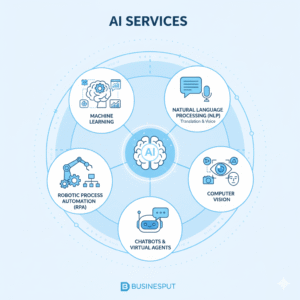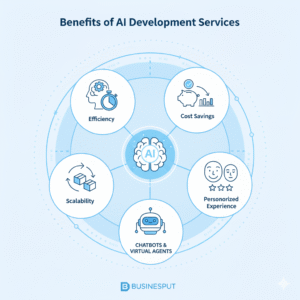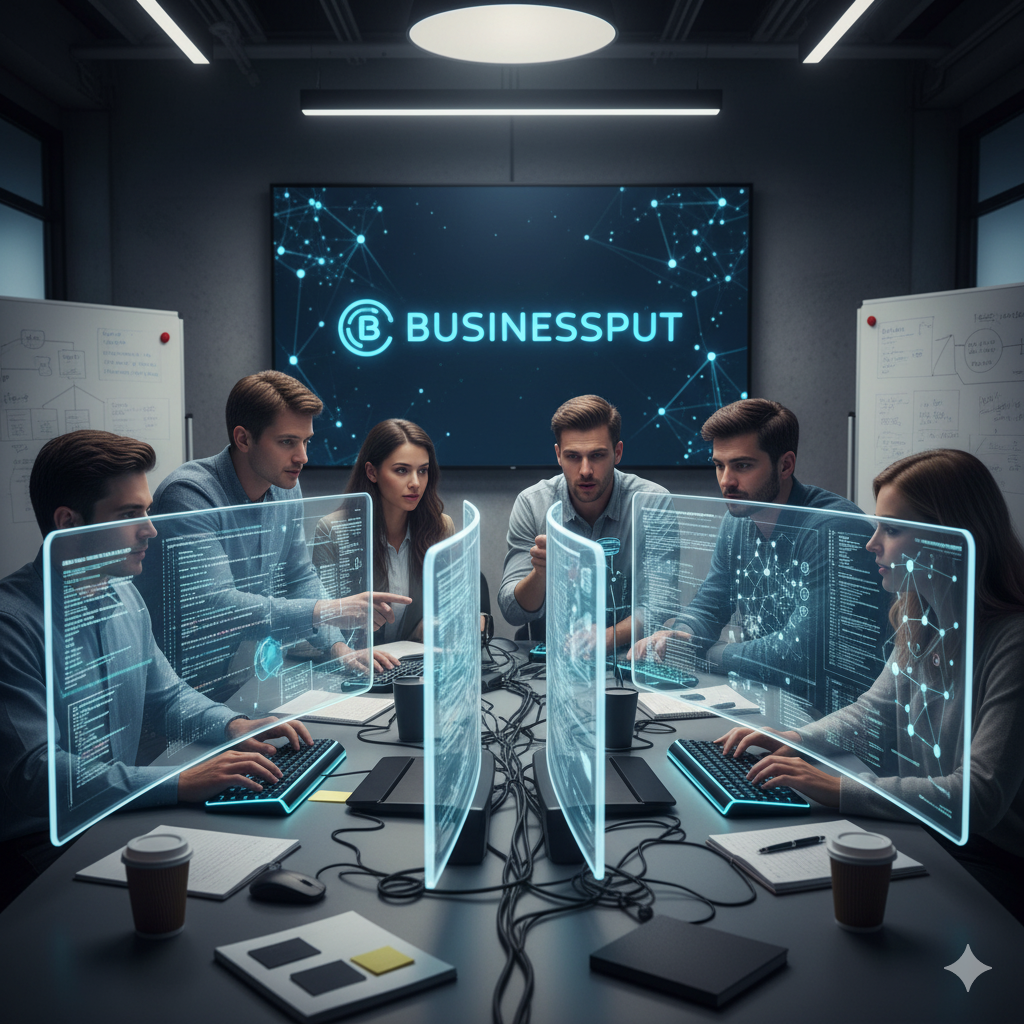🤖 AI Development Services: Transforming Businesses and Driving Innovation in 2025 🌟
Artificial Intelligence (AI) isn’t just a tech buzzword anymore — it’s a game-changer for businesses of all sizes. From automating mundane tasks to predicting customer behavior, AI is shaping the way companies operate, make decisions, and compete in a global market.
But leveraging AI effectively requires expertise, strategy, and the right tools — this is where AI development services come in. They provide businesses with tailored solutions to integrate AI into operations, products, and services efficiently.
Let’s explore the first five key sections of this topic in detail:
1️⃣ Introduction: Why AI Development Services Matter 🌐
In today’s fast-paced digital era, companies are drowning in data, facing growing customer expectations, and competing in increasingly globalized markets. AI development services allow businesses to unlock the potential of data, automate processes, and make smarter, faster decisions.
Here’s why this topic is crucial in 2025:
-
Efficiency & Automation: Repetitive, time-consuming tasks can now be automated with AI, freeing human resources for strategic and creative work.
-
Data-Driven Decisions: AI can analyze massive datasets in seconds, giving actionable insights that humans would take weeks to uncover.
-
Customer Experience Enhancement: AI enables personalized recommendations, chatbots, and virtual assistants to improve customer engagement and satisfaction.
-
Innovation & Competitive Edge: Businesses that adopt AI stay ahead of competitors by delivering smarter solutions faster.
💡 Example: Companies like Netflix, Amazon, and Spotify use AI not only to recommend content but also to predict trends, optimize supply chains, and reduce operational costs.
In short, AI development services are no longer optional — they’re essential for businesses that want to thrive in a digital-first world.
2️⃣ What Are AI Development Services? 🧩
AI development services are professional solutions that help organizations design, build, and deploy AI-powered systems. These services are far more than just software development; they involve:
-
Data preparation and cleaning
-
Building machine learning or AI models
-
Integration with existing systems
-
Ongoing maintenance and optimization
There are two main types of AI development services:
-
Custom AI Development: Tailored solutions designed to meet a specific business need. For example:
-
A retail company developing an AI model to predict customer churn.
-
A healthcare startup creating an AI system to detect early signs of disease from patient scans.
-
-
AI-as-a-Service (AIaaS): Ready-made AI solutions that can be deployed quickly through the cloud. Examples include:
-
Microsoft Azure AI
-
IBM Watson
-
OpenAI’s GPT APIs
-
The goal of AI development services is to help businesses harness AI’s power without needing a full in-house AI team, saving time, money, and reducing risk.

3️⃣ Types of AI Development Services 🤖
AI development is a vast field, and businesses can leverage it in multiple ways depending on their goals. Here are the most popular types:
3.1 Machine Learning & Predictive Analytics 📊
Machine Learning (ML) allows systems to learn from data without explicit programming. Predictive analytics uses ML to forecast future outcomes based on historical data.
Use Cases:
-
E-commerce sites predicting which products a customer is likely to buy next.
-
Banks detecting potential loan defaults before they occur.
-
Healthcare predicting disease outbreaks or patient risk factors.
Popular Tools: TensorFlow, PyTorch, Scikit-learn
💡 Example: Amazon’s recommendation engine uses ML to predict and suggest products to customers, driving sales and enhancing user experience.
3.2 AI Chatbots & Virtual Assistants 💬
AI-powered chatbots and virtual assistants have become essential tools for modern businesses. They provide instant support, 24/7, and can handle thousands of interactions simultaneously.
Benefits:
-
Reduced operational costs
-
Faster response time
-
Personalized user interactions
Popular Platforms: Dialogflow, IBM Watson Assistant, Microsoft Bot Framework
💡 Example: Many online retailers use chatbots to answer FAQs, track orders, and even upsell products — improving customer satisfaction while reducing the load on human agents.
3.3 Business Intelligence & Data Analysis 📈
AI-powered analytics platforms turn raw data into actionable insights, helping businesses make informed decisions.
Applications:
-
Market research and competitor analysis
-
Sales forecasting and inventory management
-
Customer segmentation for targeted marketing
💡 Example: Netflix analyzes viewing patterns to decide which shows to produce next, ensuring higher engagement and ROI.
3.4 Process Automation & RPA (Robotic Process Automation) 🔄
Robotic Process Automation (RPA) combined with AI can automate repetitive, rule-based tasks such as:
-
Data entry
-
Invoice processing
-
Email sorting and ticket handling
Benefits:
-
Reduced human error
-
Increased productivity
-
Faster task completion
Popular Tools: UiPath, Automation Anywhere, Blue Prism
💡 Example: Financial firms use RPA with AI to process loan applications in minutes, a process that previously took days.
3.5 Computer Vision & Image Recognition 🌐
Computer vision allows machines to see, interpret, and respond to visual data. This technology is transforming multiple industries.
Applications:
-
Facial recognition for security
-
Quality control in manufacturing
-
Autonomous vehicles detecting obstacles
Popular Tools: OpenCV, Google Vision AI
💡 Example: Tesla’s autonomous driving system uses computer vision to identify road signs, lanes, and obstacles in real time.
3.6 Natural Language Processing (NLP) 📝
NLP enables AI to understand, interpret, and generate human language, making it critical for communication-driven applications.
Applications:
-
Automated content creation
-
Sentiment analysis of customer reviews
-
Real-time translation and transcription
Popular Tools: OpenAI GPT, BERT, Hugging Face Transformers
💡 Example: Grammarly uses NLP to suggest writing improvements in real time, enhancing clarity, grammar, and tone.
4️⃣ How Businesses Use AI Development Services 💼
AI development services are not limited to tech companies — they are now being adopted across industries worldwide. Here’s a quick overview:
E-Commerce 🛒
-
Personalized product recommendations
-
AI-powered chatbots for instant support
-
Predictive analytics for inventory management
Healthcare 🏥
-
Early disease detection using AI models
-
Patient management and virtual assistants
-
Analyzing medical scans for faster diagnostics
Finance 💰
-
Fraud detection and prevention
-
AI-driven investment insights
-
Chatbots handling customer queries
Manufacturing 🏭
-
Predictive maintenance of equipment
-
AI quality control systems
-
Optimized supply chain operations
Education & Remote Learning 📚
-
AI tutors providing personalized learning paths
-
Automated grading systems
-
Learning analytics for student performance improvement
💡 Key Insight: Across all sectors, AI development services increase efficiency, reduce costs, and improve decision-making, making them indispensable in 2025.

5️⃣ Benefits of AI Development Services 🌟
Businesses investing in AI development enjoy multiple tangible and intangible benefits:
1️⃣ Improved Efficiency & Productivity ✅
AI can handle repetitive tasks, streamline workflows, and automate decision-making processes, freeing human teams to focus on strategic priorities.
2️⃣ Cost Reduction 💰
Automation reduces manual labor and errors, leading to significant savings on operational costs.
3️⃣ Personalized Customer Experience 💡
AI analyzes customer behavior to deliver personalized recommendations, promotions, and support, boosting loyalty and engagement.
4️⃣ Data-Driven Decision Making 📊
AI analyzes massive datasets in seconds, providing insights that humans would take weeks to uncover.
5️⃣ Scalability & Flexibility 🌍
AI systems can scale alongside the business, adapting to growing data volumes, users, and operational needs without major infrastructure changes.
💬 Example: Spotify uses AI to recommend playlists and content to users based on their listening habits, creating a highly personalized experience that keeps millions engaged daily
6️⃣ How to Choose the Right AI Development Service Provider 🤝
Choosing the right AI development service provider is crucial for success. A poor choice can result in wasted time, money, and even failed projects. Here’s a detailed guide to help businesses make the right decision:
1. Expertise & Experience
-
Look for providers with proven experience in your industry.
-
Review their portfolio of AI projects, case studies, and client testimonials.
-
Ask about technologies and frameworks they specialize in, like TensorFlow, PyTorch, or OpenAI APIs.
2. Cost vs ROI 💰
-
AI projects can be costly, so consider the long-term return on investment.
-
Compare quotes from multiple vendors but prioritize quality over price.
3. Security & Compliance 🔐
-
AI handles sensitive data, so ensure the provider adheres to data protection standards like GDPR, HIPAA, or ISO 27001.
-
Ask about encryption, access control, and compliance certifications.
4. Customization & Flexibility ⚙️
-
Avoid one-size-fits-all solutions; AI should be tailored to your unique business needs.
-
The provider should be flexible to adapt models and algorithms as your business grows.
5. Post-Deployment Support & Maintenance
-
AI models require ongoing updates, monitoring, and fine-tuning.
-
Ensure the provider offers continuous support, troubleshooting, and staff training.
💡 Tip: A reliable AI development partner acts like a strategic consultant, not just a software vendor. They help your business unlock maximum value from AI investment.

7️⃣ Emerging Trends in AI Development Services (2025) 🔮
AI development is evolving rapidly. Staying updated on trends helps businesses remain competitive and innovative.
1. AI-as-a-Service (AIaaS) 🌩️
-
Cloud-based AI platforms allow businesses to access ready-made AI tools without building infrastructure.
-
Examples: Microsoft Azure AI, Google AI, OpenAI API.
-
Benefits: Faster deployment, cost-effective, and scalable.
2. Low-Code / No-Code AI Platforms
-
These platforms allow non-technical teams to build AI solutions.
-
Users can train models, deploy chatbots, and automate workflows without coding.
-
Example platforms: DataRobot, H2O.ai.
3. Explainable AI (XAI) 🔍
-
AI decisions can be complex and opaque. XAI makes models transparent and understandable.
-
Helps businesses trust AI outputs and ensures regulatory compliance.
4. Industry-Specific AI Solutions
-
AI is being tailored for specific industries, from healthcare diagnostics to fintech fraud detection.
-
These specialized solutions reduce deployment time and enhance performance.
5. AI + IoT Integration 🌐
-
AI is increasingly integrated with Internet of Things (IoT) devices for smarter automation.
-
Examples: Smart factories with predictive maintenance, intelligent homes with AI energy optimization.
💡 Insight: Staying ahead of trends ensures your AI systems remain relevant, efficient, and competitive in 2025 and beyond.
8️⃣ Challenges & Risks in AI Development ⚠️
Despite its many benefits, AI development comes with unique challenges that businesses must be aware of:
1. Data Quality & Availability
-
AI relies on large, clean datasets to learn effectively.
-
Poor or biased data can result in inaccurate predictions or flawed models.
2. Integration with Legacy Systems
-
Many businesses still use older software.
-
Integrating new AI solutions with legacy systems can be technically complex and time-consuming.
3. Ethical Concerns & Bias
-
AI models can unintentionally perpetuate biases present in the data.
-
Businesses must implement ethical AI practices, including regular audits and fairness checks.
4. Rapid Technological Changes
-
AI is evolving quickly. A model developed today may become outdated within months.
-
Continuous monitoring, updates, and retraining are essential to maintain relevance.
5. Cost & Resource Constraints
-
Developing AI can require specialized talent, infrastructure, and investment.
-
Small businesses may need cloud-based solutions or partnerships to overcome budget limitations.
💬 Key Insight: Awareness of these challenges allows businesses to plan strategically and minimize risk while maximizing AI benefits.
9️⃣ The Future of AI Development Services 🌟
AI development services are shaping the future of business in ways that were unimaginable just a decade ago. Here’s what the near future looks like:
Smarter Workflows
-
AI will increasingly automate complex tasks, not just repetitive ones.
-
Example: AI legal assistants drafting contracts or AI finance tools analyzing market trends in real time.
AI-Powered Remote Work
-
AI will enhance remote collaboration through virtual assistants, automated meeting summaries, and intelligent scheduling.
Human + AI Collaboration
-
AI won’t replace humans — it will augment human capabilities.
-
Businesses will rely on AI to handle data-heavy tasks while humans focus on creativity, strategy, and decision-making.
Industry-Specific Expansion
-
Expect more tailored AI solutions in healthcare, logistics, fintech, and retail.
-
These solutions will be faster to deploy, easier to integrate, and more cost-effective.
Ethical & Responsible AI
-
Transparency, explainability, and fairness will become non-negotiable for AI adoption.
-
Companies that implement responsible AI will gain trust and credibility with customers and regulators.
💡 Insight: AI development services are not just a tool — they are a strategic necessity for businesses that want to stay competitive, innovative, and efficient in the coming years.
🔟 Conclusion: Embracing AI Development Services 💼
AI development services are transforming the way businesses operate, offering opportunities to automate, innovate, and scale like never before. From machine learning and chatbots to predictive analytics and RPA, these services empower companies to:
-
Increase productivity and efficiency ✅
-
Reduce costs 💰
-
Enhance customer experiences 💡
-
Make smarter, data-driven decisions 📊
-
Scale operations seamlessly 🌍
However, success requires choosing the right partner, understanding challenges, and staying updated with emerging trends.
💬 Final Thought: The future belongs to businesses that embrace AI strategically, leveraging its power to augment human potential rather than replace it. By adopting AI development services, companies can not only survive but thrive in the digital-first era. 🌟

